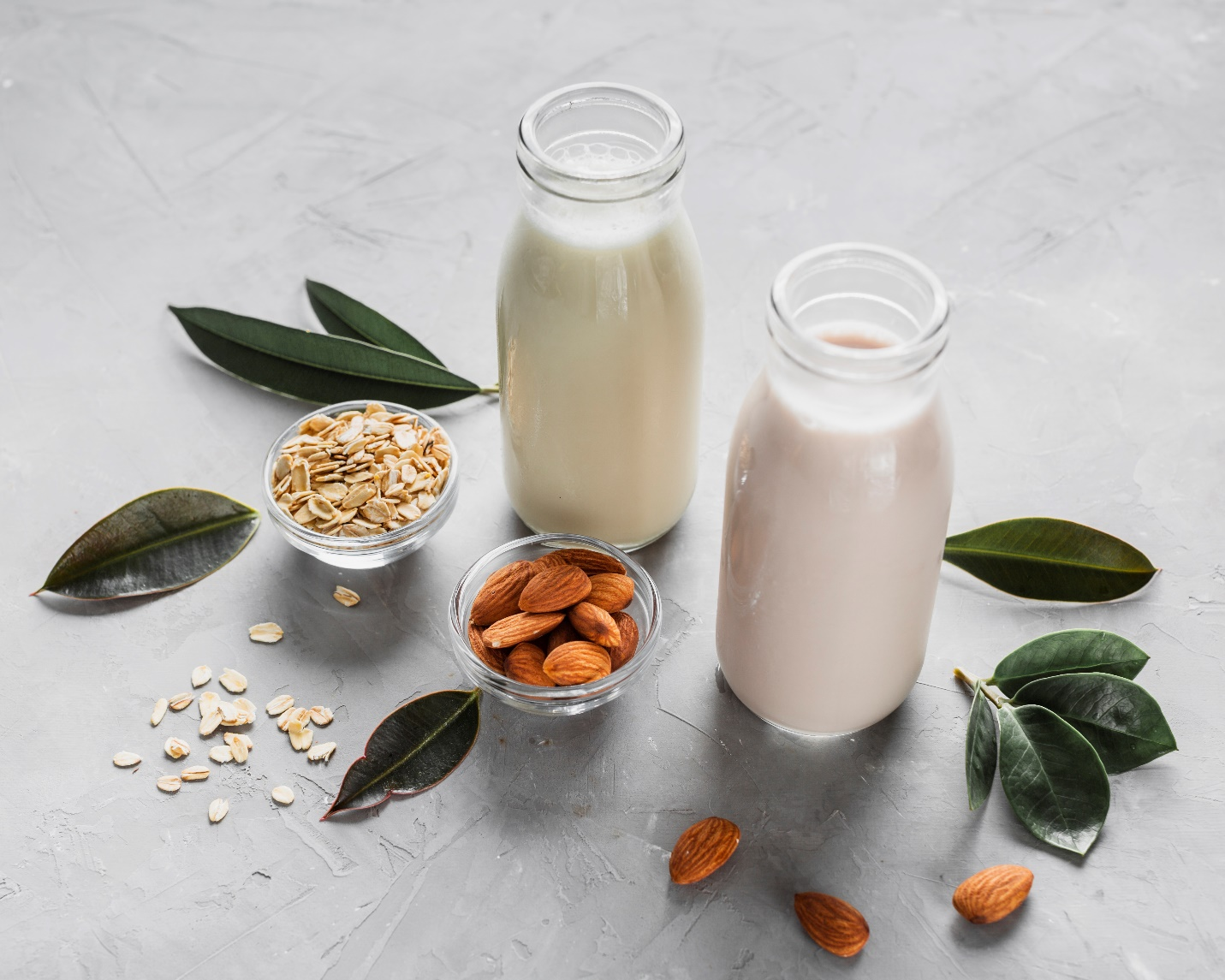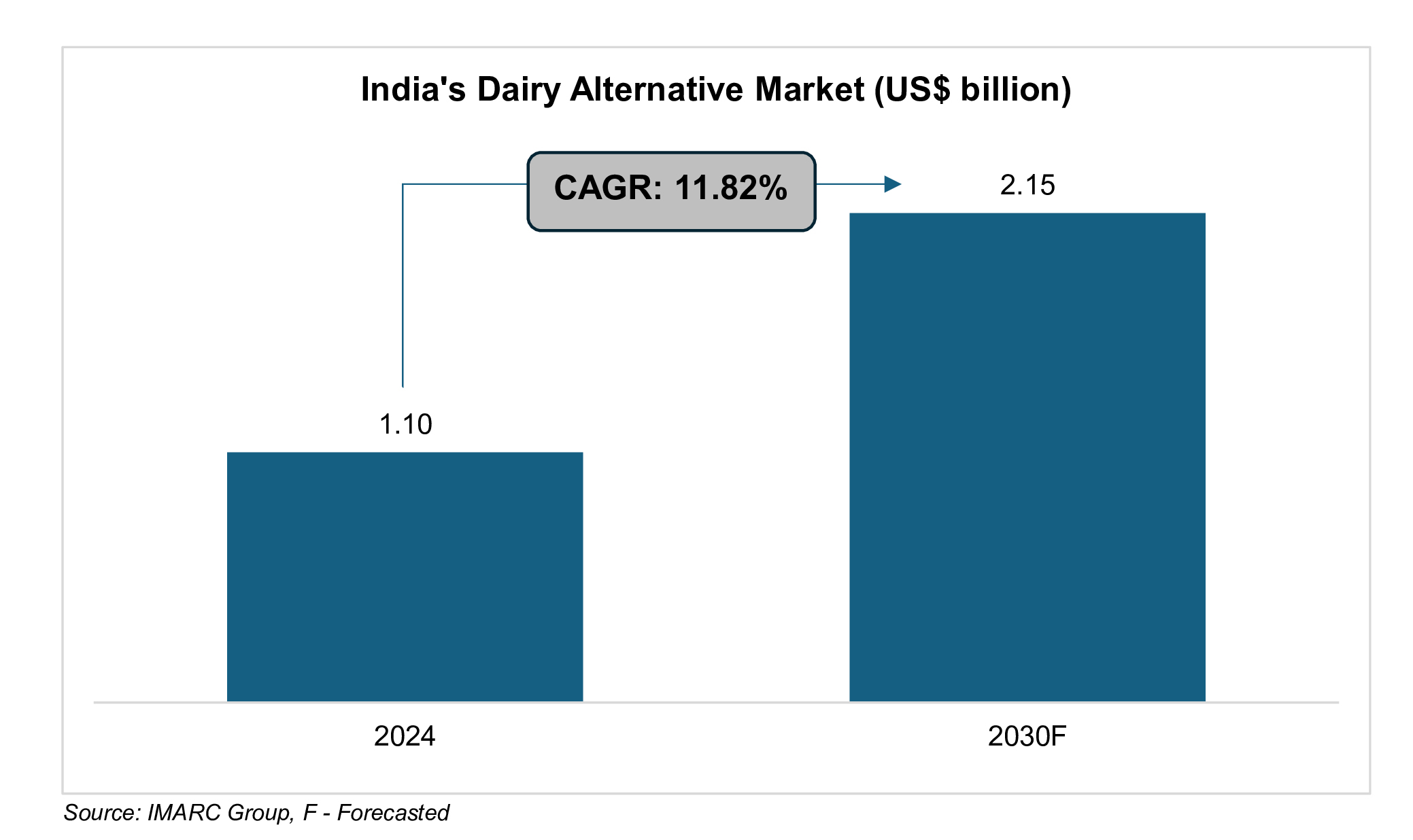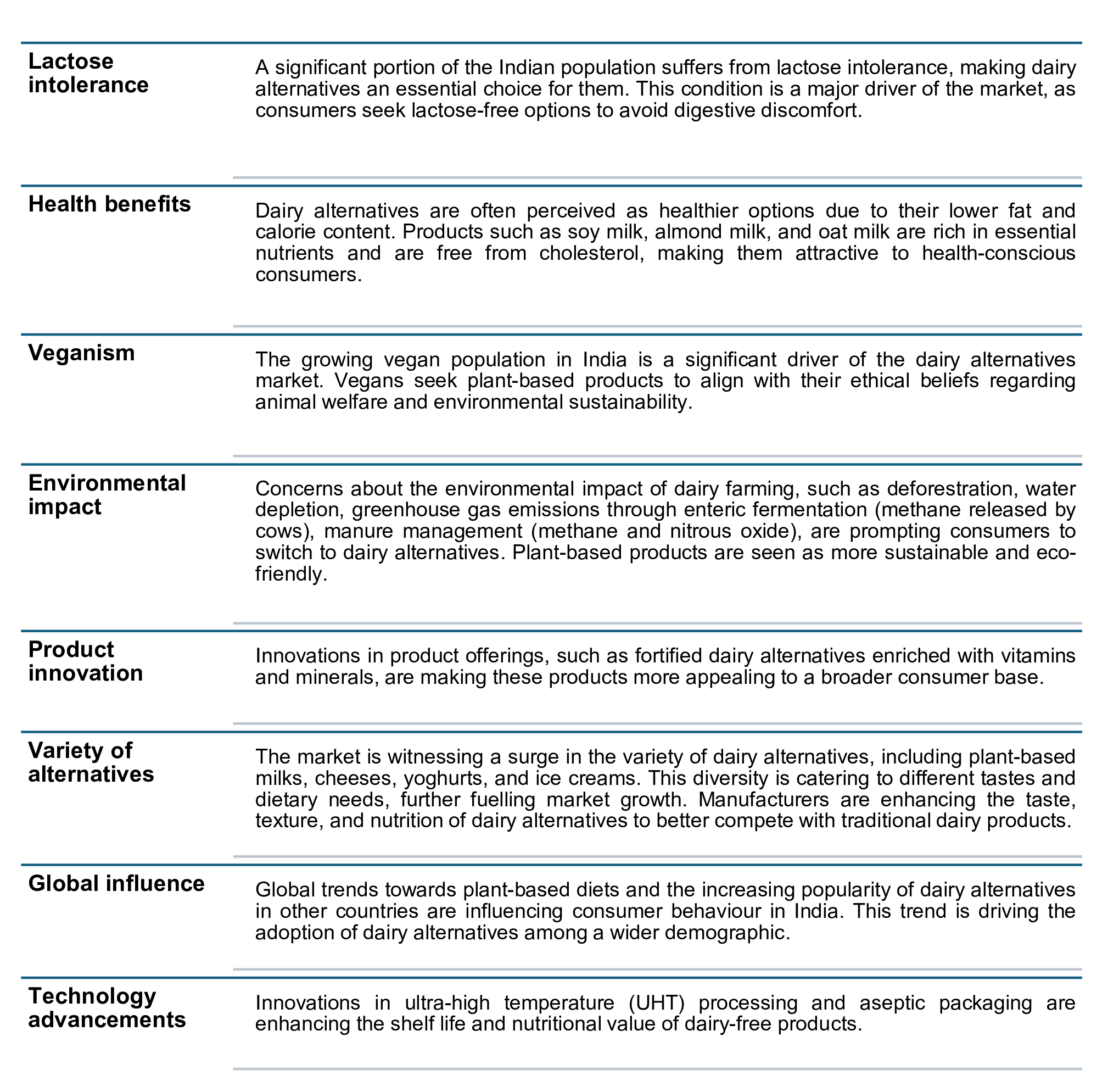SEARCH
RECENT POSTS
Categories
- Agriculture (29)
- Automobiles (18)
- Banking and Financial services (31)
- Consumer Markets (46)
- Defence (6)
- Ecommerce (20)
- Economy (66)
- Education (13)
- Engineering (6)
- Exports (21)
- Healthcare (24)
- India Inc. (8)
- Infrastructure (29)
- Manufacturing (26)
- Media and Entertainment (13)
- Micro, Small & Medium Enterprises (MSMEs) (15)
- Miscellaneous (30)
- Perspectives from India (33)
- Pharmaceuticals (4)
- Railways (4)
- Real Estate (16)
- Renewable Energy (17)
- Research and Development (8)
- Retail (1)
- Services (6)
- Startups (15)
- Technology (53)
- Textiles (6)
- Tourism (12)
- Trade (5)
Dairy Alternatives in India: How Consumer Health Trends Are Changing the Market

- Oct 15, 2025, 10:05
- Agriculture
- IBEF
Traditional dairy products have a special importance in Indian traditions, culture and daily lifestyle. However, rising health awareness, global food trends, and higher disposable incomes are shifting consumer preferences towards healthier alternatives. This changing demand, along with the easy availability of plant-based dairy alternatives, has boosted growth in the emerging sector. Urban areas, particularly metro cities such as Mumbai, Delhi, and Bangalore, are at the forefront of this trend.
Growing market size of dairy alternatives in India
India’s dairy alternative industry has grown remarkably in the past few years. Concern for the environment and global food patterns have made the country's urban community embrace plant-based dairy alternatives. Moreover, government support, technologies and innovations, as well as the availability of raw materials, have helped startups in the dairy and plant-based alternatives sectors in India. Currently, around 60% of India’s population is suffering from lactose intolerance disorder, and around 9% of Indians have adopted vegan food habits. These factors have contributed to India’s dairy alternatives market reaching Rs. 956 crore (US$ 1.10 billion) in 2024. As per the IMARC report, India’s dairy alternatives market is anticipated to reach Rs. 1,869 crore (US$ 2.15 billion) by 2030, with a CAGR of 11.82%.

Plant-based dairy alternatives
Dairy alternatives made from nuts, seeds, grains, or legumes are described as plant-based dairy alternatives. These alternatives are packed with vitamins, nutrients, fibres, and many other health benefits. This is one of the best alternative ways to intake protein with low sugar for individuals suffering from lactose intolerance disorder, where the body is unable to digest lactose, i.e., the sugar present in traditional dairy products. Almonds, soy, oats, rice, etc., are used as alternatives to dairy products. A variety of dairy products, including yoghurt, cheese, and butter, can be made using these plant-based alternatives. They appear and taste very similar to traditional milk; hence, they can be used in regular tea, coffee, bakery products, etc.
Surging demand for plant-based alternatives
According to IMARC, India’s vegan food market reached Rs. 12,730 crore (US$ 1.46 billion) in 2024 and is expected to reach Rs. 33,139 crore (US$ 3.82 billion) by 2033, reflecting a CAGR of 10% between 2025-33. India, with approximately 276 million vegetarians, has shifted to vegan alternatives due to growing awareness of environmental sustainability and health consciousness, resulting in significant growth in demand for plant-based alternatives in India. The plant-based dairy product market in India reached Rs. 21,675 crore (US$ 2.5 billion) in 2024 and is estimated to reach Rs. 42,483 crore (US$ 4.9 billion) by 2030, as per IMARC.
Health benefits of plant-based dairy alternatives
Plant-based dairy alternatives are popular for offering various health benefits, especially for those seeking low saturated fat consumption, lactose-free intake, high antioxidant properties, etc. Besides this, plant-based dairy alternatives also act as a preventative and can cure many common chronic diseases:
- Diabetes: Diabetes is one of the most common health problems found in India. Around 101 million people, i.e., 10.1% of the population, are suffering from diabetes, and approximately 136 million Indians are diagnosed with pre-diabetic symptoms, putting them at high risk of developing diabetes in the near future. Including dairy substitutes such as almond milk and unsweetened soy milk, which contain healthy nutrients, vitamins, a lower glycemic index (GI), and low carbohydrates compared with traditional cow's milk, can help maintain nutritional balance, bone health and promote better blood sugar control in people suffering with diabetes.
- Cardiovascular health: Maintaining lower cholesterol levels is very important for good cardiovascular health. A type of soluble fibre called beta-glucans, packed in oats, helps reduce cholesterol levels in the body. Hence, oat milk is recommended for patients suffering from cardiovascular problems. Nuts, like almonds, are packed with monosaturated fats, phytosterols, and fibres and act as supporting agents to lower bad cholesterol levels.
- Lactose intolerance: Lactose intolerance is a digestive issue. People having this disorder are unable to digest the sugar found in traditional dairy products known as lactose. Plant-based dairy products made from almonds, oats, rice, and soy act as perfect alternatives for these people.
- Foetal health: Protein intake is very important for pregnant women as it plays a crucial role in the growth and development of the foetus. Dairy alternatives consist of tofu, beans, lentils, tempeh, nuts, seeds, etc. Soy milk can be an excellent alternative to traditional dairy milk for mothers to nurture their foetus.
- Arthritis: Arthritis is another major and commonly found health concern in India. Around 180 million people, i.e., 15-20% of India’s population, are affected by arthritis. Along with other medications and dietary changes, consumption of plant-based dairy substitutes plays a vital role in overruling symptoms and reducing inflammation of arthritis, as these alternatives are packed with nutrients, anti-inflammatories, antioxidants polyphenols, vitamins, etc.
Growth drivers
The Indian dairy alternative segment is experiencing a significant growth due to changes in lifestyle preferences, lactose intolerance disorder, rising veganism, ethical considerations, ongoing global trends and availability of diverse alternative product range in the market.

The way forward
The dairy alternatives market in India is growing steadily as more people become aware of health, environmental, and ethical concerns. Urban consumers, especially in metro cities, are showing a strong interest in plant-based products due to rising cases of lactose intolerance, diabetes, and heart-related issues. The availability of almond, soy, oat, and other plant-based milks, yoghurts, and cheeses is helping consumers find healthy substitutes for regular dairy. These alternatives are also useful for people with specific dietary needs, such as pregnant women or those with arthritis. Even though plant-based dairy is gaining popularity, traditional dairy still has a strong emotional and cultural connection in India, especially in rural areas. Also, strict food regulations and competition from well-established dairy brands make it difficult for new companies to grow. However, with increasing awareness and support for startups, this segment is likely to expand further. As more people look for healthier and more sustainable options, the demand for dairy alternatives in India is expected to keep rising in the coming years.
















